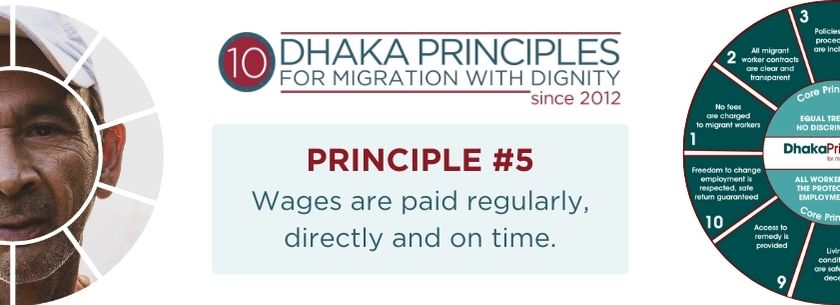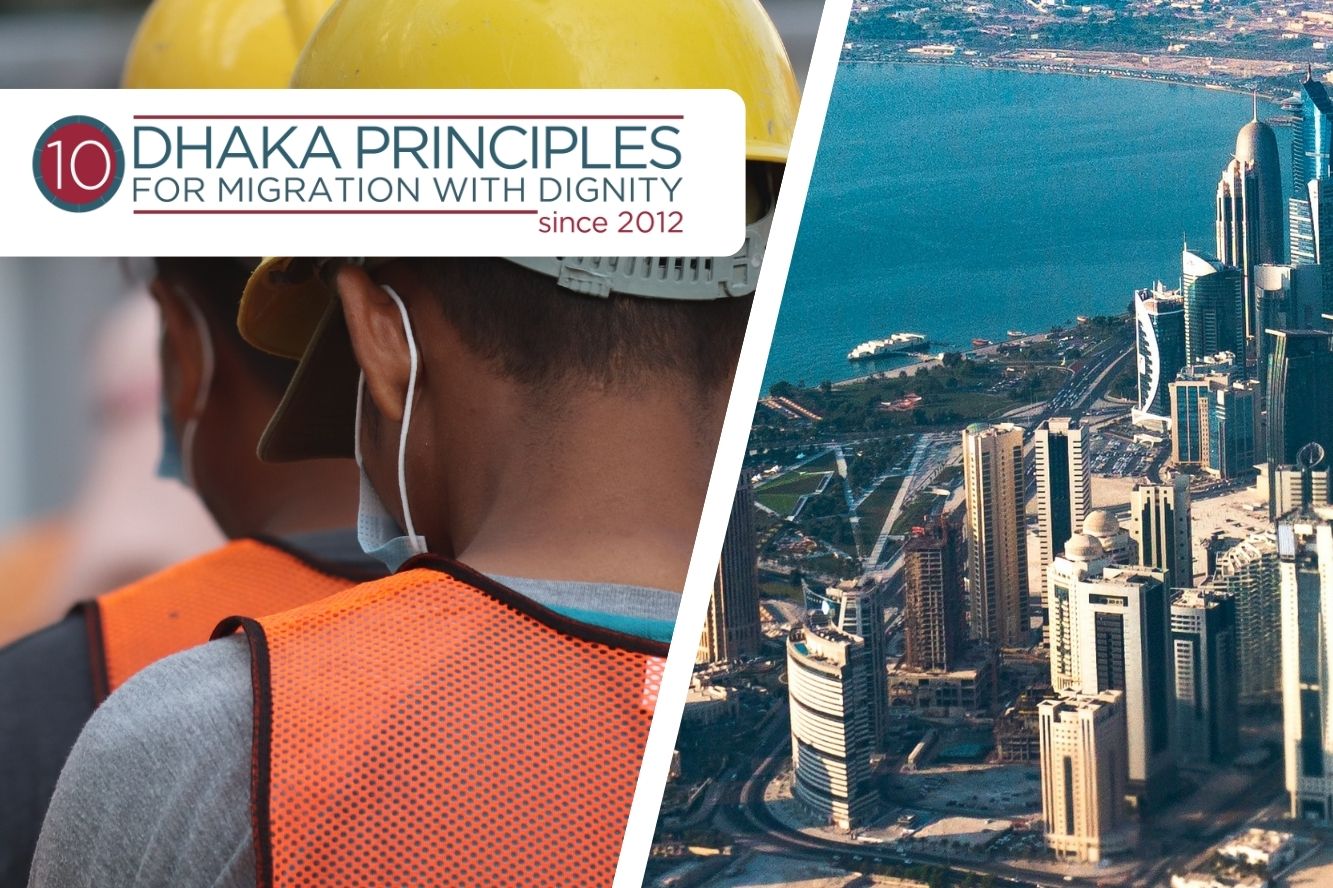Throughout 2022, IHRB is marking ten years of the Dhaka Principles for Migration with Dignity with guest commentaries from representatives of business, trade unions, civil society organisations, and the UN system that reflect on the continuing importance of each of the twelve individual Principles. These experts are exploring challenges relating to each Principle in turn and discussing how faster progress can be made.
The fifth component of the Dhaka Principles for Migration with Dignity requires that workers should receive their wages regularly, directly, and on time.
Writing in the context of global supply chains for tea and coffee, academic and author Genevieve Le-Baron argues scholars and policy-makers should take the role of providing wages in shaping or protecting workers from exploitation far more seriously. Wage violations, she says, do not occur randomly, but are a logical outcome of contemporary business models and supply chain dynamics and clearly traceable to commercial practices and pressures. This aligns with the findings from research undertaken by my own organisation, Engineers Against Poverty (EAP). Whilst our findings applies to the construction sector in the Gulf, as this commentary notes, similar situations exist across a range of other sectors and geographic locations.
Wage violations... do not occur randomly, but are a logical outcome of contemporary business models and supply chain dynamics and clearly traceable to commercial practices and pressures.
Construction projects are tied to the geography where they are located, and the employment of migrant labour has been a feature of the sector throughout history. An extensive body of evidence on the integration of migrants into the construction workforce concludes that wage theft (deliberate underpayment) and wage withholding are systemic characteristics of the industry but are especially experienced by migrants employed at the bottom of subcontracting chains.
EAP research found just that in Qatar, during a period of intense construction activity in the lead-up to the FIFA World Cup 2022, some 90% of construction workers in Qatar are migrants from low wage economies in South Asia. These workers usually have to pay costs and fees to recruiting agents for the chance to get a job in Qatar, and many arrive saddled with debt. After they start work, the biggest challenge they face is getting paid in full and on time for the work they do.
An extensive body of evidence on the integration of migrants into the construction workforce concludes that wage theft and wage withholding are systemic characteristics of the industry.
Our in-depth interviews with international contractors, clients and government advisers, showed that the immediate problem of late payment could be traced to changes made in the business models of lead contractors. In their search for greater labour flexibility, large construction companies operating in Qatar which had formerly employed workers directly, had relied on extensive subcontracting and outsourcing of labour through intermediaries, as companies also do in other parts of the world. This devolved significant risk and responsibility for their workforce to networks of smaller businesses. A survey of the workforce composition of major construction companies in Qatar and UAE conducted by the Business and human Rights Resource Centre in 2018 found up to 50% of workers to be employed by intermediaries.
The vast majority of intermediaries supplying labour are very small firms (including some run by former migrant workers) with few assets and limited liquidity. They are unable to pay wages until they have received payment from the subcontractor to whom they have supplied workers, who in turn may still be waiting for payment from those above in the long subcontracting chain. While government advisers deny it, clients often do not pay on time, due to inevitable disputes over quality and/or progress of the work. At the same time, the common acceptance/prevalence in the region of the practice of ‘pay when paid’ means that contractors in the upper tiers of subcontracting chains can legitimately hold back payment to boost their own cash flow, starving the lower tiers of funds. The immediate cause of late payment of wages can be traced to the slow movement of interim payments for construction work down through the labour contracting chain.
EAP research found just that in Qatar, during a period of intense construction activity in the lead-up to the FIFA World Cup 2022, some 90% of construction workers in Qatar are migrants from low wage economies in South Asia. These workers usually have to pay costs and fees to recruiting agents for the chance to get a job in Qatar, and many arrive saddled with debt.
The claim of lack of funds to pay wages when they are due can also be used as an excuse, and may in fact hide the insufficiency of money to cover the cost of labour supply in the contract. The predominant form of procurement of construction projects is international competitive bidding with contracts awarded to the lowest priced bidder, and the competition for contracts in the Gulf Cooperation Countries (GCC) construction industry is intense. Competition to supply workers to such projects, at the bottom of the supply chain, is even more intense, creating downward pressure on prices in order to win contracts. ‘Where buyers do not pay suppliers enough to cover the costs of production and margins at the base of supply chains, businesses are not able to cover the cost of relevant wage standards‘ . In such an intensely competitive environment, cheating workers of their wages becomes inevitable.
To deter wage violations in the sector, change is needed to ensure there is sufficient money earmarked in the contract to pay living wages to workers, and that the money actually gets to them. There has been some progress in Qatar. With technical assistance from the International Labour Organisation (ILO) the government has introduced an improved Wage Protection System (WPS), expanded coverage of employers and workers and imposed sanctions on companies that do not pay wages. Payment through banks is now obligatory and employers are not deemed to have paid their workers unless this is done through the WPS. A ‘wage guarantee fund’ has been established to pay workers whose direct employer cannot or will not pay, and a non-discriminatory minimum wage is adopted. However, in its latest report the ILO admits that wage abuse remains the primary concern of workers and many still have to wait long periods to receive their due wages and benefits. Clearly more has to be done.

The government has so far failed to address the issue of immediate employers claiming they do not have funds to pay when wages are due. The government can do this by clamping down on the practice of ‘pay when paid’ or by extending liability for the payment of wages to the lead contractor or the client, which is the direction in which policy has been moving to counteract wage theft in many other parts of the world, including China and USA. In the GCC, the Supreme Committee for the World Cup in Qatar is one major client that has shown the way forward through a more responsible procurement and contracting strategy. This involves:
- ensuring sufficient funds to pay wages and benefits,
- exercising due diligence in the selection of contractors,
- arranging for the pre-mobilisation approval of subcontractors and labour suppliers,
- reducing the number of tiers in the labour contracting chain drastically,
- accepting responsibility for the payment of wages when immediate employers cannot pay.
Furthermore, assigning legal liability for the payment of wages in full and on time to main contractors and/or clients would lead others to do likewise.
Instances of low wages, late payment and wage theft are common across construction and many other sectors that employ migrant workers. Despite the vital role that the migrant workforces play in building infrastructure, these instances continue, indicating the low regard with which these workers are perceived and seen. Migrant workers deserve better. Fair and prompt payment of wages is a fundamental right of all workers regardless of the sector or geography where they work. Dhaka Principle 5 is the foundation of Migration with Dignity.

This month’s expert is Jill Wells, Senior Policy Adviser at Engineers Against Poverty.
Jill Wells is a social scientist with a significant record of research and publication on economic, social and labour issues in the construction industry. She has had a long career that has straddled work in academia, governments and international agencies, including a period of employment as ‘construction industry specialist’ with the International Labour Organisation. While at the ILO she delivered an extensive survey of labour migration for work in the construction industry in three regions (the Gulf, East Asia and Europe) as well as a major study of changes in employment relationships in the construction industry worldwide. Much of her work has focused on improving the health and safety of construction workers, as well as finding ways to ensure that they are properly paid for the work they do.





























The perception of ‘value’ needs to change if the World Bank’s mission is to succeed
Last week we attended the Spring Meetings of the World Bank and International Monetary Fund (IMF) in Washington, D.C. The annual IMF-World Bank meetings bring together finance ministers and central bankers from all regions as a platform for official...
26 April 2024 | Commentary
Commentary by Vasuki Shastry, Author, ESG/Strategic Communications Expert; International Advisory Council, IHRB Haley St. Dennis, Head of Just Transitions, IHRB